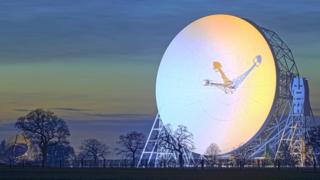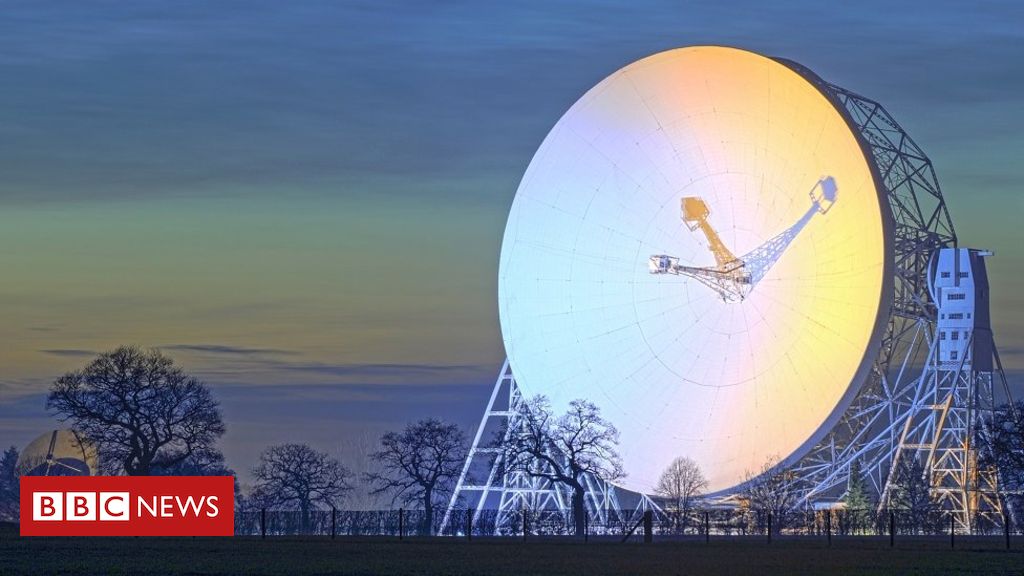
Image copyright
Loop Images
The Lovell Telescope forms the centrepiece of the Jodrell Bank site
Jodrell Bank Observatory has been declared a Unesco World Heritage Site.
It has been at the forefront of astronomical research since its inception in 1945 and tracked US and Russian craft during the space race.
The site in Cheshire is part of the University of Manchester. It is dominated by the landmark Lovell Telescope.
It joins the ancient Iraqi city of Babylon and other locations that have been added to the prestigious list.
Image copyright
Getty Images
Soviet cosmonaut Valery Bykovsky (left), who went on three space flights, met Jodrell Bank founder Sir Bernard Lovell in 1967
The UN World Heritage Committee is meeting in Azerbaijan until 10 July to decide on the latest sites to be given the honour – awarded to areas considered to be important for the whole of humanity, which will be protected by international treaties.
Scientific research began at Jodrell Bank Observatory in 1945 when the physicist Sir Bernard Lovell came to the University of Manchester.
The site pioneered the then new science of radio astronomy, which used radio waves instead of visible light to understand the universe.
Jodrell Bank Observatory
Image copyright
Anthony Holloway
The Lovell Telescope was almost not completed as its construction ran over budget
- The Lovell Telescope, which was the world’s largest telescope when it was completed in 1957, is now the third largest
- Jodrell Bank was on standby as the UK’s early warning system against any potential nuclear attack during the 1962 Cuban Missile Crisis
- The Lovell Telescope tracked the first spacecraft to make a soft landing on the Moon in 1966, printing the first picture from the lunar surface
- It is so sensitive that mobile phone use on the site is normally forbidden and the staff microwave oven is shielded by a metal box to prevent interference
- The site featured in BBC’s Stargazing Live series, Douglas Adams’ Hitchhiker’s Guide to the Galaxy and Doctor Who
The site’s new accolade marks the end of a decade-long bid to gain World Heritage status, following a 2010 application to be included on the UK’s nominations shortlist.
Professor Teresa Anderson, director of the Jodrell Bank Discovery Centre, said: “This is wonderful news and a great day in the history of Jodrell Bank.
“It honours the pioneering work of Sir Bernard Lovell and the early scientists here, together with the world-leading research that continues to this day.”
A University of Manchester spokeswoman said the observatory fulfilled the judges’ criteria, which included being “a masterpiece of human creative genius”, due to its scientific achievements.
Image copyright
University of Manchester
Sir Bernard Lovell (centre) and his researchers were among the pioneers of radio astronomy
Jodrell Bank also hosts the headquarters of the Square Kilometre Array, an international project to create the world’s largest radio telescope by linking thousands of dishes and receivers across Africa and Australia.
You may also like:
The observatory is among 32 sites in the UK – including Stonehenge and the Giant’s Causeway – to receive World Heritage status and joins a list of 1,100 sites worldwide.
More than 185,000 people visit Jodrell Bank annually.
In 2018, the University of Manchester was granted £12.1m from the National Lottery Heritage Fund and £4m from the government’s Department for Culture, Media and Sport for a new discovery centre at the observatory.
Heritage Minister Rebecca Pow said: “The research completed here has transformed our understanding of the universe and it is right that this is recognised.
“Today’s announcement will make sure that this remarkable site will continue to inspire young scientists and astronomers all over the world.”















